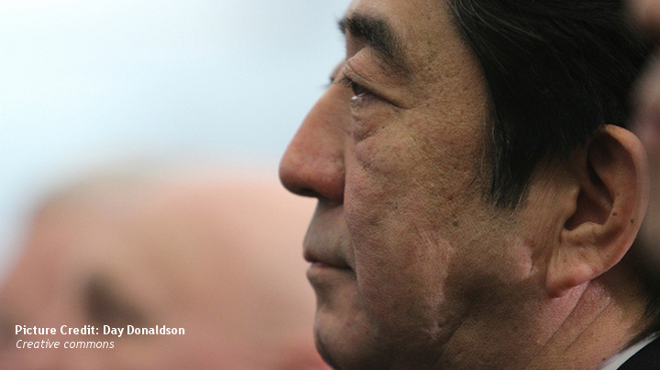Is Japan Set to Take on a More Global Role in 2018?

2017 saw many changes in the geopolitical and security situation in East Asia and the world. The United States has arguably become more unpredictable, tensions with North Korea have reached all-time-highs, and China appears to be stepping up its role in the region. These geopolitical forces are pushing Japan in the direction that Prime Minister Abe has long wanted to take it; namely turning Japan into a ‘normal’ power, more active in safeguarding its interests in military, economic, and diplomatic spheres. Recent actions on the part of the Abe government indicate this may be the case, with Tokyo bolstering defense and economic ties the world over.
Making New Friends
In Eastern Europe, Japan’s economic and geopolitical strategies intersect. Tokyo’s increased interest in the region is underpinned by the need to boost the Japanese economy through securing international trade deals, and to combat growing Chinese influence.
The Baltic and Balkan States are situated at the Western end of China’s $1tn Belt and Road Initiative (BRI). Beijing has engaged with the region through the 16-plus-one framework; a yearly meeting of Eastern and Central European countries with China to promote Chinese infrastructure deals. The BRI and the 16-plus-one has raised concern in Brussels that Beijing is dividing the EU against itself by cooperating with only certain members of it, thus hindering EU unity. While Tokyo is not against the BRI per se, it is also nonetheless suspicious of Beijing using its economic clout as a form of coercion to support its geopolitical goals, as has been done in other cases. Therefore, Tokyo is keen to enhance its own diplomatic and economic connections.
Japan has no equivalent to the 16-plus-one framework (and does not intend to create one), but it has nonetheless engaged some European countries on bilateral levels. The beginning of 2018 saw Prime Minister Abe visit Eastern Europe, accompanied by representatives of 30 private companies. First, Abe visited the three Baltic States of Estonia, Latvia, and Lithuania, where he entered Japan into agreements over cooperation in IT, transport, and medicine. Abe then went south to the Balkans. In Serbia, the Prime Minister agreed to aid the economic and social development of the country and pledged to advocate on Serbia’s behalf for EU accession. Then, in Bulgaria Abe announced that Japan will organize a business forum to facilitate Japanese investment in the country. However, the key reason behind the visit to Bulgaria was because the country currently occupies the presidency of the European Council. Abe met with Bulgarian Prime Minister Boyko Borisov to conclude the Japan-EU Economic Partnership Agreement (EPA). Negotiations over the EPA ended in December 2017, and it is expected to raise Japanese GDP by 1% per year. Therefore, Tokyo intends to become a competitor with China in the region, thus increasing Japan’s soft power.
Security the Indo-Pacific
This year will likely see Tokyo stepping up efforts to promote trade and military agreements in the Indo-Pacific region. Beijing has become increasingly assertive in the South and East China Seas, demonstrated by the latest discovery of a Chinese nuclear submarine near the disputed Senkaku/Diaoyu Islands, an area of critical importance for Japan. This comes in combination with a potentially changing role of the United States in the region. As a country dependent on maritime transport, Japan will likely be more active in maintaining the status-quo.
While Abe was in Eastern Europe, Foreign Minister Kono visited Sri Lanka, the Maldives, and Pakistan, where he promoted Japanese infrastructure development projects, cooperation in maritime security, and, in Pakistan, offered Tokyo’s support in counter-terrorism measures. In all countries, Tokyo put special emphasis on promoting its ‘Free and Open Indo-Pacific Strategy’. This entails securing freedom of navigation and the rule of law through enhanced trade and diplomatic connections with regional players.
Alongside its diplomatic and economic initiatives, Tokyo has pursued maritime defense agreements. The biggest security project in the region is no doubt the Quadrilateral Security Dialogue, consisting of Japan, India, Australia, and the United States. Its intention is to provide a counter to the Chinese military in the Indo-Pacific region. Other agreements over cooperation in maritime law enforcement currently exist with Indonesia, the Philippines, Malaysia, and Vietnam. In January, Abe met with Australia’s Turnbull to formalize a new security agreement. The two also reaffirmed their determination to see the TPP, a trade agreement partially intended to block Chinese economic expansion, go into effect as soon as possible. By signing military pacts with countries in the region and promoting a ‘Free and Open Indo-Pacific’, Tokyo is backing up trade policy with force.
North Korea
The final major policy objective of Japan in 2018 will be countering North Korea. During Abe’s and Kono’s visits, pressure on North Korea and closing loopholes in the sanctions regimes was high on the agenda. Japan has insisted countries cut connections with Pyongyang, and has earmarked $10.8mn to help Asian and African states counter money laundering and arms trading which benefits Pyongyang.
Therefore, 2018 will likely see Japan engaging ever more active in pursuing its economic and geopolitical objectives. Prime Minister Abe has expressed hope that by 2020, Japan will emerge to occupy a greater geopolitical role. This year may see the beginning of that.